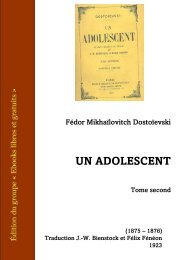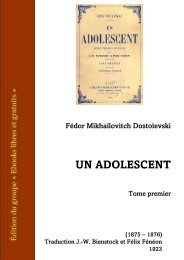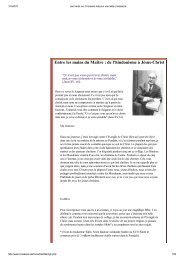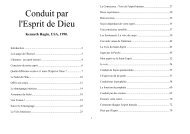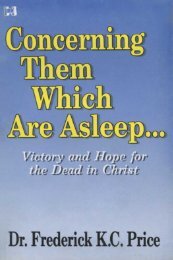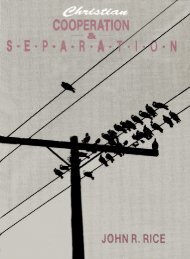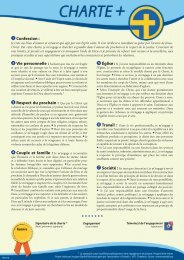341332
Create successful ePaper yourself
Turn your PDF publications into a flip-book with our unique Google optimized e-Paper software.
16 FATHERS, PASTORS AND KINGS<br />
It is certain, however, that for many of the peasantry, their bishop was a remote<br />
figure, seen only if and when he made his visitation of their parish. Instead, their<br />
parish priest, resident among them, was the peasantry’s principal point of<br />
contact with the clergy of their church. Very little evidence still exists, if it ever<br />
did, to enable the historian to trace the laity’s ‘ideal’ bishop, or his impact on<br />
prelates, and what remains is so scattered that it would require a complete project<br />
to construct a coherent overview. However, an enhanced appreciation of the<br />
episcopate’s own ideals and world view is surely a prerequisite for this.<br />
What is offered here, then, is a broad presentation and analysis of views<br />
within the French church that, above all, enables us to understand what bishops<br />
thought about their office, why they did so and how it affected their<br />
behaviour. By drawing on the wide range of published and private material, the<br />
chapters that follow provide a composite and comprehensive image of the ideal<br />
bishop, as it was perceived by French bishops themselves and by their contemporaries,<br />
and as it shaped the Tridentine church. What follows, therefore, is<br />
not primarily a study of events, but one of mentalities and ideas and of the many<br />
ways in which they interplayed with events. Its purpose is to expand significantly<br />
our understanding of an extremely influential seventeenth-century elite<br />
and of the culture of the Catholic church during this formative period.<br />
Notes<br />
1 Joseph Bergin, ‘The Counter-Reformation Church and its Bishops’, Past and Present, 165<br />
(1999), 30–73, at 30.<br />
2 Nor to Protestant churches in which bishops remained as the heads of dioceses. For the<br />
attempts by Anglican bishops to adjust to the Reformation by references to Pauline and apostolic<br />
imagery, see Kenneth Fincham, Prelate as Pastor. The Episcopate of James I (Oxford 1990).<br />
3 André Deroo, Saint Charles Borromée (Paris 1963); Ruth Kleinman, Saint Francis de Sales and<br />
the Protestants (Geneva 1962).<br />
4 Hubert Jedin, A History of the Council of Trent, trans. Ernest Graf, 2 vols (London 1957–61).<br />
5 Hubert Jedin, L’Evêque dans la tradition pastorale du xvi e siècle, ed. Paul Broutin (Brussels<br />
1953).<br />
6 Henry Outram Evennett, The Spirit of the Counter-Reformation (Cambridge 1968).<br />
7 For example: Michael Carroll, Veiled Threats. The Logic of Popular Catholicism in Italy (Baltimore<br />
and London 1996); Stephen Haliczer, Sexuality in the Confessional. A Sacrament Profaned<br />
(New York and Oxford 1986); David Sabean, Power in the Blood. Popular Culture and Village<br />
Discourse in Early Modern Germany (Cambridge 1984).<br />
8 Jean Delumeau, Sin and Fear. The Emergence of a Western Guilt Culture 13th–18th Centuries,<br />
trans. Eric Nicholson (New York 1990); Gabriel Le Bras, Etudes de sociologie religieuse, 2 vols<br />
(Paris 1955); Gabriel Le Bras, L’Eglise et le village (Paris 1976).<br />
9 Jonathan Dewald, Aristocratic Experience and the Origins of Modern Culture. France 1570–1715<br />
(Berkeley and Oxford 1993); Alexander Sedgwick, Jansenism in Seventeenth-Century France.<br />
Voices from the Wilderness (Charlottesville, Virginia 1977).<br />
10 Keith Luria, Territories of Grace. Cultural Change in the Seventeenth-Century Diocese of Grenoble<br />
(Berkeley and Oxford 1991); Bernard Peyrous, La Réforme catholique à Bordeaux (1600–<br />
1719), 2 vols (Bordeaux 1995); Robert Sauzet, Contre-réforme et réforme catholique en bas-<br />
Languedoc. Le diocèse de Nîmes au xvii e siècle (Louvain and Paris 1979).<br />
11 Luria, Territories, pp. 44–5.







